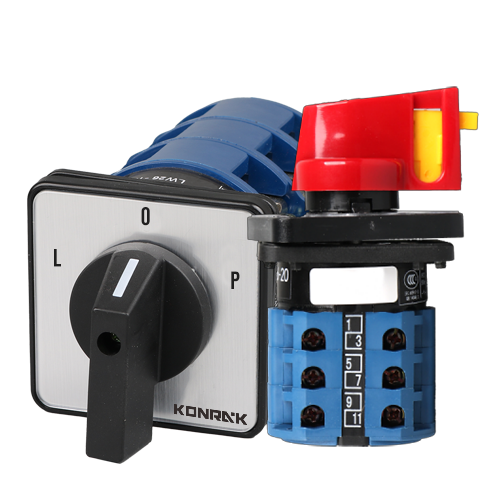
Salutations
Rotary Cam Switches Overview
A rotary cam switch is driven by a turnable shaft. Rotation of the shaft works with a cam design to open or close contacts to achieve individual or sequential contact switching. Shaft positions define multiple contact configurations.
Common applications involve automation and consumer gadgets. They enable dependable switching through varied ratings. Position feedback is provided using detents or light indicators.
- Frequently employed in manufacturing and household gadgets
- Supporting diverse electrical loads creates flexibility
Ensuring Safety with Disconnect Switches
They operate as important devices for circuit protection. They facilitate safe power isolation for maintenance. This isolation is crucial for safe maintenance and fault management. Turn off the disconnect to avoid hazards. Incorrect operation causes significant hazards.
To preserve electrical safety, follow these critical instructions: Verify the switch corresponding to your wiring. Make sure power is shut off before action. Utilize safety devices and tools for shock prevention. After work, re-engage the disconnect switch and test circuits.
- At intervals, scrutinize disconnect for deterioration
- Secure in clean, dry locations to avoid damage
- Request electrician guidance if needed
Role of Isolator Switches
An isolator switch provides essential power disconnection in electrical systems. Fuses and breakers control faults, isolators separate power. Isolating circuits protects personnel during servicing.
- Used commonly for safe inspection and repair tasks
- Visual signals display switch state for safety
- They play a key role in mitigating accident risks
Efficient Energy Change
Switching devices secure stable power transfers. Their function involves prompt load switching to alternate sources. They cut down interruptions in electricity supply. Time without power is negligible due to improvements. Found in data centers needing power reliability. Continuous operation ensured through auto switching
Basics of Cam Switches
Understanding cam design aids circuit mastery. Rotary cams operate via handles managing contact sets. Contact layout supports exact circuit switching. Switch function reliability depends on the cam design. They excel in environments requiring accuracy and strength
- Understanding the construction simplifies troubleshooting
- Recognizing contact types and their roles is vital for installation
- Awareness of technical details supports reliable functioning
Disconnect Switch Necessity
System safety relies on effective disconnect devices. Disconnects manage current discontinuation. Their function assists in secure handling of equipment. Wide ranges of disconnect types exist for different uses
- They are common components in many operational areas They find application in numerous industrial and commercial settings They are employed widely in industrial and consumer applications Rotary cam switches are essential in various industrial domains
- Typical disconnect devices appear in factories
- Load break isolates circuits under operating load
- Vacuum disconnect switches use vacuum technology for high performance
- Air break disconnectors use non-contact gaps
Identifying disconnect variants assists selection. Evaluating specs and environment assures secure operation
Deciding on Suitable Isolation Device
Selecting isolators calls for careful factor assessment. Inspecting system current and load characteristics. Voltage parameters guide correct device usage. Electrical frequency is a key parameter. Size and mechanical characteristics influence choice. Use of flame-retardant elements is beneficial. Meticulous study ensures suitable device choice.
Changeover Switches for Industrial Systems
Switches support core processes in industrial contexts. Switch devices control flow of electricity between feeds. They support distributed power, redundancy, and load sharing. Switches stabilize power in automation and control systems. They stand as essential assets for industrial power management
Evaluation of Cam and Isolation Switches
Decision-making involves understanding switch characteristics. Cam switches provide diverse modes via position selection. They grant electrical separation as needed. They separate electrical currents physically. Isolators have enhanced capacity and robust construction
Identify and Fix Switch Malfunctions
Electrical switch issues can be challenging but often are easily fixed. Verify all switch connections and tighten screws. Flicker often relates to switch contact degradation or bulb faults. Assess switches for damage or worn contacts and renew. Review circuit protection devices and reset as required. Qualified technicians are needed for ongoing difficulties
Cam Switch Engineering and Behavior
These switches regulate circuit flow through rotary electromechanics. Shaft rotation sequentially changes the connection points. Rotating the shaft engages different contacts to control circuits. The profile of the cam dictates switch functionality and states. Advanced cams facilitate various circuit formations
They are employed widely in industrial and consumer applications. Deployed in factory equipment, electronic products, vehicles, and networks.
- These switches have broad industrial and commercial deployment Rotary cam technology is versatile across many fields Rotary cam technology is versatile across many fields They appear frequently in manufacturing and consumer sectors
- Switch size, contact number, component selection and environment matter
